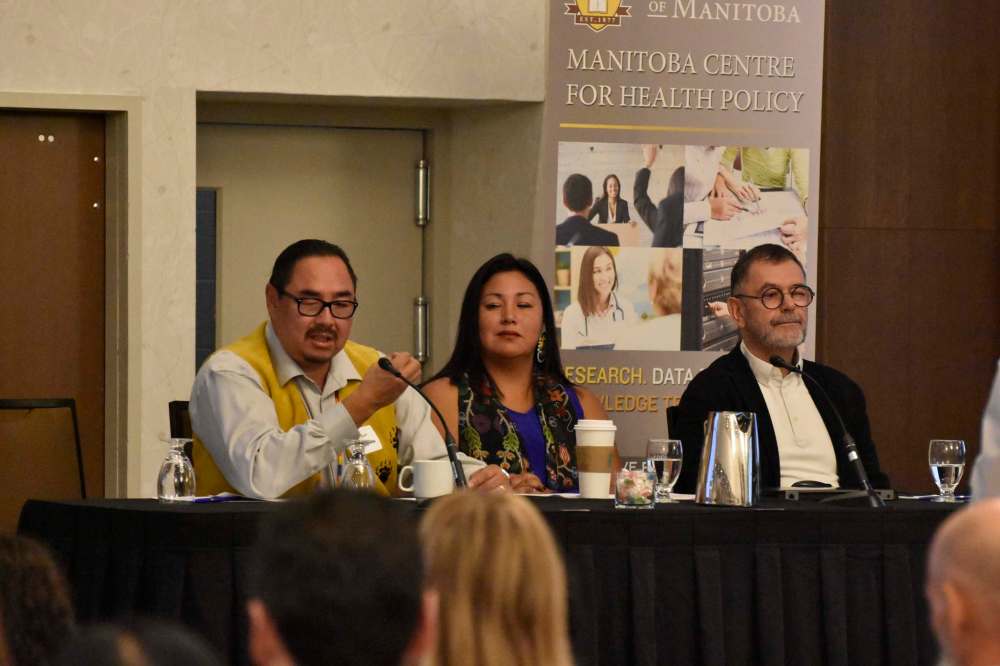Health gap between First Nations, other Manitobans widening: study
Advertisement
Read this article for free:
or
Already have an account? Log in here »
To continue reading, please subscribe:
Monthly Digital Subscription
$1 per week for 24 weeks*
- Enjoy unlimited reading on winnipegfreepress.com
- Read the E-Edition, our digital replica newspaper
- Access News Break, our award-winning app
- Play interactive puzzles
*Billed as $4.00 plus GST every four weeks. After 24 weeks, price increases to the regular rate of $19.00 plus GST every four weeks. Offer available to new and qualified returning subscribers only. Cancel any time.
Monthly Digital Subscription
$4.75/week*
- Enjoy unlimited reading on winnipegfreepress.com
- Read the E-Edition, our digital replica newspaper
- Access News Break, our award-winning app
- Play interactive puzzles
*Billed as $19 plus GST every four weeks. Cancel any time.
To continue reading, please subscribe:
Add Free Press access to your Brandon Sun subscription for only an additional
$1 for the first 4 weeks*
*Your next subscription payment will increase by $1.00 and you will be charged $16.99 plus GST for four weeks. After four weeks, your payment will increase to $23.99 plus GST every four weeks.
Read unlimited articles for free today:
or
Already have an account? Log in here »
Hey there, time traveller!
This article was published 17/09/2019 (2226 days ago), so information in it may no longer be current.
The health gap between First Nations people and other Manitobans is big and only getting bigger, even though the changes needed to address the discrepancy have been known for decades.
That’s the takeaway from a report released Tuesday, entitled Health Status of and Access to Healthcare by Registered First Nation Peoples in Manitoba.
Since the last study on First Nations health in 2002, the difference in life expectancy for the two groups widened to 11 years from seven.

“These results are not surprising to us,” said Leona Star, director of research for the First Nations Health and Social Secretariat of Manitoba, which co-led the study. “We’ve known this for a number of years, but we just didn’t have the evidence to actually piece together that story.”
One of the most “disturbing” discoveries is First Nations people are more than twice as likely to be prescribed highly addictive opioids, said Dr. Alan Katz, director of the Manitoba Centre for Health Policy.
Repeat prescriptions pose the biggest risk for problematic use, and First Nations people are almost four times more likely to get four or more refills. But it’s difficult to determine how many of the opioid prescriptions are inappropriate, Katz said.
“We think what’s happening (is) many people are using opioids and other substances to self-medicate, that people who are depressed and people who have problems related to racism and colonialism, the only way they know how to deal with this — because we don’t have a lot of culturally appropriate mental health services — is that the end up self-medicating,” Katz said.
“And clinicians are facilitating that, unfortunately.”
First Nations Manitobans are four times more likely to attempt or die by suicide. But the statistics for mental illness don’t reflect that huge differential, Katz said, meaning people aren’t getting help and their need isn’t being recognized.
The study’s main recommendation: all decisions about First Nations health need to be led by and made in consultation with First Nations people.
“We need to be able to tell our own story,” Star said.
The study marks the first time First Nations have co-led such a study on health care in Canada.
“Often, research has been undertaken without the involvement of First Nations, without their input, so that their priorities are often not considered,” Star said.
She also emphasized the importance of getting more health care into First Nations communities and more Indigenous people into health professions. First Nations people need sovereignty over their health data, she said.
There’s still no good data on non-status Indigenous Manitobans and from nursing stations, Katz said.
He said health care alone won’t solve these problems; it will require addressing the roots of the issue in racism and colonialism.
“It’s not good enough that we just know about it now, we need action,” Katz said as the crowd gathered for the report launch applauded. “It’s time for change.”
Many of the report’s recommendations echo changes that have been part of past reports, as far back as the 1999 Aboriginal Justice Inquiry.
“We’re missing a partner at the table with us, and that’s the provincial government. The provincial government doesn’t have a seat for us at the table,” said Sheldon Kent, chief of Black River First Nation and chairman of the First Nations Health and Social Secretariat of Manitoba.
“The results of this worsening inequity ends up costing the provincial health system in the long run,” he said.
“There is a financial tsunami coming if inequities are not addressed now. Effectively closing this gap can only be done by involving First Nations in deciding, designing, and delivering our own health care.”
tvanderhart@freepress.mb.ca
Twitter: @tessavanderhart


